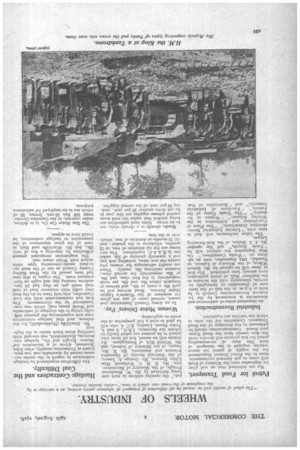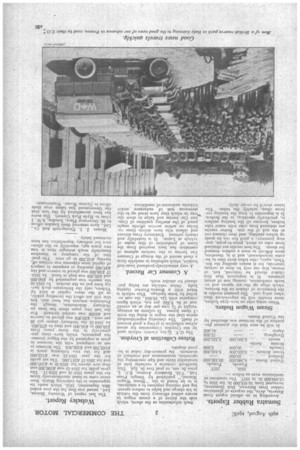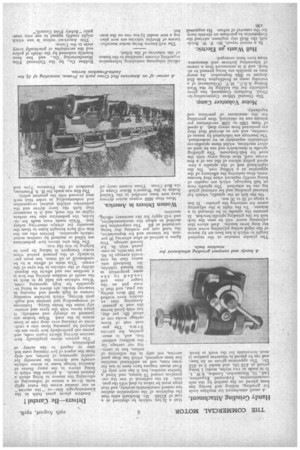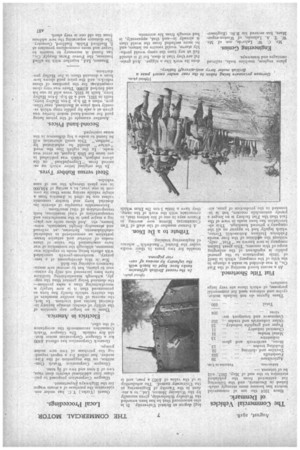WHEELS OF INDUSTRY.
Page 4

Page 5

Page 6

Page 7

If you've noticed an error in this article please click here to report it so we can fix it.
The wheel of wealth will be slowed by all difficulties of transport at whatever points arising, as a carriage is by the roughness of the roads over which it ntns."'—.Tohn Beattie Crazier. •
Petrol for Food Transport.
We are informed that on and after 1st September next the Ministry of Food will cease to put forward recommendations to the Petrol Control Department for the supply of petrol for motor vehicles engaged in the transport of food. The duty of recommending petrol for this purpose will devolve from the date named upon the :Road Transport Board. Communications should be addressed to the Secretary of the Road Transport Committee for the area in which the vehicles are registered.
Industrial Reconstruction.
An important series of conferences and discussions is announced by the Industrial _Reconstruction Council to be held at 6 p.m. in the hall of the Listitute of Journalists at fortnightly intervals, alternately with the lectures at the Saddlers' Hall, of which particulars. have already been published. The first of these will be opened by Mr. Robert Wilson, of the Ministry of Labour, on. Tuesday, 10th September, with an address on " Works. Committees." On 24th September the subject will be "Trade Boards," and the speaker Mr. J. J. Hallon, of the Anti-Sweating League.
The 'other conferences will deal in turn with "Interim Industrial Reconstruction Committees," "The Place of Conciliation and Arbitration in the Whitley Scheme," "Women in Industry," " The Trade Union of the Future," " Functions of Industrial Councils," and '' Restriction of Out put," the opening address in each case being delivered by Mr. W. Henderson Pringle, of the Ministry of Reconstruction, • Mr. E. IL C. Wethered, Miss Lilian Dawson, Mr. George A. Isaacs, of the National Society of Operative -Printers and Assistants, Mr. E. McGegan, of the Ministry of Labour, and Mr. Wilfria Hill, of Birmingham. No tickets will be issued, but all those who intend to be present are asked kindly to inform the Secretary, I.R.C., 2 and 4, Tudor Street, London' KC. 4, who will be glad to send a full prospectus of the series on applieatioy.
Women Motor Drivers' Pay.
In an Army Council Instruction just issued, revised rates of pay are given for members of the Women's Legion Motor Drivers. Head drivers will he paid 45s. a week, or 42s., and drivers or despatch riders 41s. and 38s. per week respectively in the first class, and 38s. or 358. respectively for second class ; learners receiving 25s. weekly. There are sundry advantages for women who accept the new rates, including sick 'pay and a quarterly gratuity of 13s. underthe Q.M.A.A.C. regulations. The new terms aie for (a) duration of war, or 12 months, whichever is the greater ; and (b) 12 months or duration of war, whichever is the less.
Roads, already in a chronic state, are to be worse. Some local authorities are being notified that under the road stone control scheme supplies are this year to be opt down another 20 per cent., making 50 per cent, of the normal idpplies.
Haulage Contractors and the Coal Difficulty.
The difficulties experienced by haulage contractors in regard to the smoke nuisance caused by unsuitable coal was mentioned at Todmorden recently, when John Boustead, driver of a locomotive for` Messrs. Knight and Co., haulage con*meters, Huddersfield, was charged with emitting dense black smoke in the highway.
Mr. Hinchliffe (Huddersfield), for the defence, said that haulage contractors were now experiencing the greatest difficulty owing to the shortage of anthracite and Welsh steam coal, which was commandeered by the Government. The firm had communicated with the Coal Controller, who told them to do the best they corild with whatever kind of coal they could get, as they had 14 locomotives running day and night on Government work. The engine in this case had been passed by the West Riding County Council as one of the most upte-date smoke-consuming type when stoked with Welsh steam coal.
The magistrates recognized present difficulties by imposing a fine of only 20s., but. Mr. Hinchliffe said that, in view of the great importance of the prosecution to haulage contractors, he would have to appeal.
The Roo Motor Car Co. is to deliver, under contract, to the Canadian Government 185 Reo 15-cwt. lorries, 85 of which are to be employed for ambulance purposes.
Steam Wagon Boilers.
Sumatra Rubber Exports.
According to an official report from Batavia, Java, the exports of plantation rubber from Belawan, Deli (Sumatra), increased from 16,418,000 lb. for 1916 to 18,949,000 lb. in 1917. The countries of destination were as follow :— It will be seen that the greatest 'froportion of the increase was absorbed by the United States.
When using coke on loco.ttype boilers, more trouble will be experienced than when using coal. The greatest trouble is the formation of clinker on the firebars, which clogs up the air spaces and retards combustion, causing loss of steam pressure. It is important that this clinker should be removed, but, of course, this can only be done at certain intervals, for it means spoiling the fire. Then, again, dike takes more time to become incandescent, and it is, therefore, more difficult to meet a sudden demand for steam. The best results are obtained from coke on short, rmint-to-point, nonstop journeys; a good fire can he made up before starting, and then cleaned out at the end of the run. Better results are obtained from coke with water tube boilers, because all the heating surface is, practically speaking, in the firebox. It is important to keep the heating surfaces dean, notably the tubes, The latter should be swept daily. Such information as the above, which aids the driver of a steam wagon to secure added efficiency from the vehicle in his charge and helps to reduce operating and running expenses to a minimum, is to be found in the " Steam Wagon Manual," published by Temple Press Ltd., 7-15, Rosebery Avenue, E.C. 1, price 2s. net, or post free 2s. 20. This handbook contains a veritable heat of invaluable hints and tips concerning the operation, maintenance and overhaul of steamers. Its present-day value is beyond dispute.
Refuse Collection at Croydon.
The C.V. 3-ton e'ectric vehicle used by the Croydon Corporation for street refuse collection is giving a good account of itielf. The cleansing superintendent states that the wagon is doing the work if three horses. It collects an average weight of 7i tons per day at an overall cost of 9s. 4.33d. per ton, which figure compares with lie. '10.68d., the cost entailed by horse haulage. This vehicle is fitted with a Ruston-Proctor tipping body. Other vehicles are being purchased for similar work.
_ A Commer Car Record.
A very attractively-produced loose-leaf booklet, which embodies in readable form a short record of the doings of Commer Car lorries in the various spheres of operation has been received from the home of production of this snake of whiele at Luton. It is tastefully and clearly printed. Testimony from drivers and others Who have driven these vehicles on active service • affords ample proof of the Sterling qualities of Commer Car lorries and helps to show the vay in which they have stood up to the strenuous test of endurance under hitherto undreamt-of conditions.
The last report of Wolseley Motors, Ltd., issued was That for the year ended 30th September, 1915, which made its appearance in the following March. Now there come to hand simultaneously those for the years 1915-16 and 1916-17. The gross profit for 1914-15 was £180,300 and. that. now shown' for 1915-16 is £197,900 and for 1916-17 2217,900, The net profit for the year 1914-15 was £115,000 and for the two following years is £102,700 and £102,900. The decrease in net as compared with the increase in gross is explained by the bigger incometax payments, which have risen progressively in the three years from 225,000 to £55,000 and then to £75,000. In 1914-15 the Ordinary shares got 20 per cent. £30,000 was placed to reserve and £6500 was carried forward. For the last two years there has been no Ordinary distribution, though the Preference interest has been met, but, this will not affect the investing public, as all the share capital is held by Vickers, only the Debenture stock having been put on the market. In 1915-16 the reserve was augmented by £60.000 and £28,200 was kept in hand. In 191617 £50,000 WRS placed to reserve and the £47,400 standing at suspense in respect of capital issue expenses was written off, leaving £12,700 to go over. The 'position of the company is therefore financially much stronger titan it Vas two years ago, especially as the allow, ance for ordinary depreciation has been increased lately.
Messrs. J. I. Thornycroft Ind Co., Ltd., have removed their London offices to 10, Grosvenor Place, London, S.W. 1 (close to Hyde Park Corner). The move has been necessitated by the' fact that the Government has taken over their offices in Caxton Mose. We5tonOter.
Handy Grinding. Attachment.
A small attac:hment for machine tools for grinding, milling and boring has been placed on the market by the sole concessionaires, FederatedExporters, Ltd.,.11, Haymarket, London, S.W. 1. It is made in two styles, model 1 being priced at 212 12s. and model 2 at 215 15s. The apparatus-pivots on its base, and can be placed in whatever position is most favourable for the work in hand.
The grinder remains at the required height to which it has been set by means of the rapid acting adjusting screw with the long lever handle. Just above this adjusting screw will be seen the lock bolt for the grinding spindle bracket. It "permits the spindle to be changed in a minute. To the right is the adjusting screw for cottering the grinder. It has a range of 25 to 30 rum.
On the left of the spindle, wheels for internal grinding and for external grinding can be attached. The spindle runs on ball bearings, which are capable of being readily replaced when they become worn, thus restoring the efficiency of the apparatus at a trifling cost. On the right-hand end of the spindle a twospeed pulley allows of the use of a fine. woven cord, thus doing away with the need for belt-fasteners. The grinding spindle is detachable and can be used on other machines, whilst these spindles are obtainable separately so we understand. The bearings are lubricated by means of vaseline, and are an devised that they are protected from emery dust. A speed of from 1200 to 1500 revolutions per minute .can be obtained, thus providing for the -maximum of precision and regularity.
Motor Volunteer Camp.
The General Officer Commanding-inChief, Northern Command, has given authority for the holding by the West Riding A.S.C., M.T. (Volunteers) of a training camp at Bridlington from 31st -August to 30th September. As many men as possible are being premed to attend, and it is announced that a course of interesting lectures and demonstra tions have been arranged. •
Hull Wants an Electric.
In a -recent report, Mr. F. W. Bricknell, the Hull city engineer, advised the Corporation to purchase an electric lorry for the removal of refuse. He suggested
A26 that a 3,1-ton vehicle be dbtained at a cost of 21165. Mr. Bricknell adds that the depletion of the corporation stables has caused considerable anxiety, and that steps must, be taken to deal with the position. At the outbreak of war the corporation 'owned 73 horses, and hired a further number, but it has now only 47. Four steam wagons have been in use for some time, and an additional machine has been acquired, which has done good service, not only in the collection of refuse, but in carrying out cartage for the military authorities, and, in emergencies, for private
r m s. The present cost of horse. cartage works out at about 23s. per day, but with hired horses the cost is greater. Assuming that an electric were worked for 250 days daring, the year, and that it were put on the longer runs and loaded in the same proportion as the horsed vehicles, Mr. Tiricknell estimates that its cost would ayerage Ls. 6d. per ton-mile, as compared with 2s. for horsed cartage. This figure is arrived at after allowing 20 per cent. for interest and for depreciation, the total cost per working day being estimated at 22. The corporation has -decided to adopt the recommendation, and will apply for the necessary official,. sanction.
Women Drivers in America.
More than 6000 women motor drivers have now been enrolled in the United States in the Women's Motor Corps of the Red Cross. These women carry all official .telegram a containing information regarding oversee casualties to the homes of the relatives of the killed.
The well-known Swiss motor manufacturers of Martini vehicles are now placing a new model 1k-ton van on the market.
Drivers—Be Careful!
America places great faith in the kinematograph film—or "the movies" as our cousins across the water aptlyterm it—as a means of influencing or educating the masses to bring about a desired result. A picture film which is being shown in the many States of America brings home to motor vehicle oemeN and drivers the necessity for careful operation of lorries, not only from the aspect of low running costs but also in regard to the safety of pedestrians. The picture shows graphically how careless driving affects repair costs, and points out particularly how tyres are desttoyed by jamming them into a curhstone or running over deep ruts or loose stones in the road. When brakes are jammed on sharply and suddenly, it plays havoc with the tyres and eventually ruins the brake lining. Instances of overspeeding and careless and negligent driving, which includes rounding corners at high speed and running in. tramway tracks, are shown as being responsible for high operating costs. When vehicles are held up in dock as the 'result of reckless driving the laze is a needless one and affects the dependability of the vehicles in the eyes of the owner. This state of affairs is to be condemnel at all times, but more particularly at the present period when i motor transport s taking its part in helping to win the war.
The film also shows how pedestrians are killed or maimed by careless motor vehicle operation. Drivers who see the film will have brought home to them the necessity for always observing safety first. While roads were made for .vehicle, the pedestrian also has certain rights on the road, and it, is necessary that both the lorry driver and the pedestrian exhibit mutual co-operation and understanding in order that each may proceed with the greatest safety. fbe film was made for H. S. Firestone, president of the Firestone Tyre and Rubber Co., by the Universal Film Manufacturing Co., and. has been heartily endorsed by the chiefs of police and the secretaries of practically every state in the Union.
This American 'notion is one which might readily appeal to our own energetic "Safety First Council."
The Commercial Vehicles • of Denmark.
Since 1914 the use of commercial motors has become more strongly established in Denmark, and the following list extracted from the published statistics to the end' of May, 191.7, will be of interest :—
These figures do not include motorcycles and sidecars used for commercial purposes, of which there are very large numbers.
Fiat Title Shortened.
At a recent board meeting of the Fiat Co., it was decided to make a change in the title of the company, which in itself of 'little importance to the general public is significant of the enlarging scope of this concern. This great Italian company is now known as " Fiat " only, without the addition of the four words Fabbrica, Italians. Automobili Toriuo, which legally had to appear on all the company's printed headings. This abbreviation has been made in view of the fact that the Fiat factory is no longer a purely automobile concern, but is interested in the production of guns, sir
plane engines, machine tools, railroad carriages and tramways.
Engineering Genius.
Mr. C. W. Isslorde, son of Mr. W. T. A. Lalonde, of Weston-superMare, has secured his B.Sc. (Engineer
ing) degree at Bristol University. It is also announced that he has been awarded the Wolseley Scholarship, given annually by the Wolseley Motors, Ltd., to a student in the Faculty of Engineering at the University named. The scholarship is of the value of .£103 a year, and is tenable for two years in their works under the Bristol "Sandwich" scheme of engineering training.
Tribute to a be Dion.
A former member of the staff of Tile Cosisinnerat Moron now serving in France says in one of his letters that, in connectlen with the work of the tamp, they have a little 1-ton De Dion which
does its work like a nigger. And grateful are they that it does, for if it should fail at any time the camp would probably starve, would 'receive no letters, and he more secluded from the world than it already is—and that, apparently, is bad enough from his accounts.
Local Proceedings.
Ossett (Yorks.) T.C. has under con. sideration the purchase of a steam wagon for the Highways pepartment. Glasgow Corporation proposed to purchase four additional electric dust 'vans, two of 2 tons and two of 3 tons.
Glasgow Corporation Watch Committee, on the suggestion of the Firemaster, has called for a report regarding the purchase of two new motor pumps. Gonreck Corporation has offered £400 for a Glasgow Corporation motor firstaid fire vehicle. The Glasgow Watch Committee recommends the acceptance of the offer.
Electrics in America.
There is no longer any question of the utility of electric storage battery indwitrial lorries and tractors. In fact, the success of the smidler members of the electric vehicle family has been so pronounced that it is now largely a manufacturing than a sales problem— the demand being greater, than the supply, although manufacturing facilities have been increased not only by cxtension to plants, but by several new manufacturers entering the field.
or is this development of a temporary, mushroom-growth associated with efforts being made to expedite war measures, although the necessities of war have emphasized the value of these modes of interior and exterior transportation as encountered in industrial establishments, factories, at railroad and steamship -freight terminals, warehouses, etc. And these units are • playing a major part in the manufacture and transportation of vital munitions; both tranaportation of vital munitions.
Innumerable examples of electric industrial lorry 'and tractor economic values can be cited in America from a single vehicle saving more than its own cost in one year, to, a saving of $54,000 in one plant through the use of nine vehicles.
Steel versus Rubber Tyres.
In Ihe original letter which we received from "Unprejudiced " on the above subject, which was published in eur issue for 15th August, an error was made. In the eighth line the word "either" should be substituted by " neither." This small alteration will be found to make a big difference in the sense conveyed.
Second-hand Prices.
Another example of the prices being paid for second-hand motet lorries was given at a sale by public rcittp which recently took place at Barrheasl, near Gies. gow, when a 25 h.p. 2-ton Halley lorry, built in 1911, and a 35 11,P. 3-ton Halley lorry, built in 1915, were sold in one lot and fetched £1900. There was very close competition for the purchase of these vehicles, and the price paid shows how keen a demand there ie for Halley -productions.
Brameo, Ltd., together with its allied business, the Power Farm Supplf. Co., has found it necessary to remove to 'larger and more commodious premises at 2, Radford Fields, Radford, Coventry. The distanee separating the new address from the old one is very short.






















